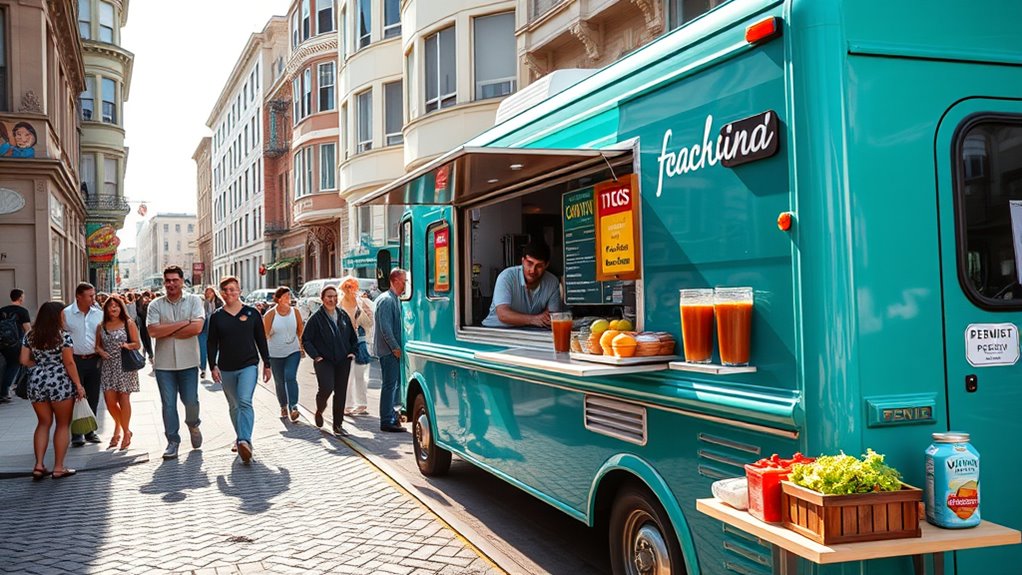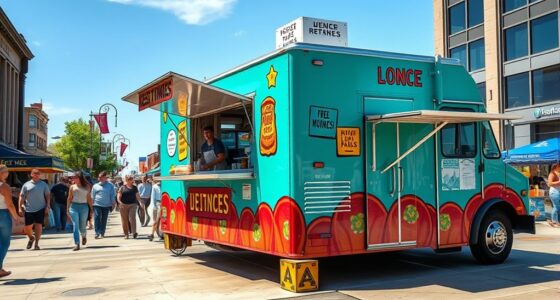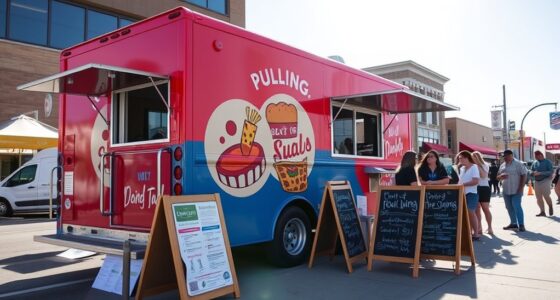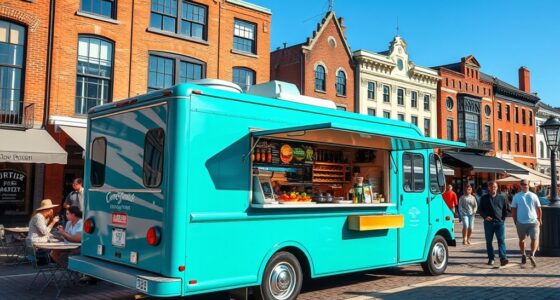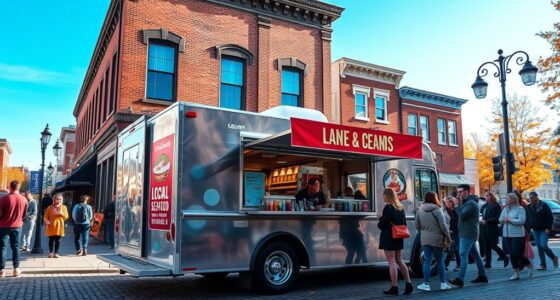To open a food truck in San Francisco, you’ll need permits from the SF Department of Public Health, along with city clearance and possibly public hearing approvals. Budget between $40,000 and $150,000 for equipment, permits, and initial costs, plus ongoing expenses of $1,700 or more monthly. Choose locations carefully and guarantee zoning compliance. Develop a safe menu, build your brand, and utilize marketing tactics like social media and community events. Keep these steps in mind, and you’ll be closer to launching your food truck successfully.
Key Takeaways
- Obtain necessary permits from SF Department of Public Health, Public Works, and Planning, including health, parking, and zoning approvals.
- Budget $40,000 to $150,000 for initial investment, equipment, permits, and ongoing monthly expenses over three years.
- Choose suitable locations such as public property, private lots, or parks, and comply with distance and buffer regulations.
- Develop a compliant menu with safety standards, proper documentation, and licensed commissary storage.
- Build strong branding and marketing through social media, community events, loyalty programs, and merchandise to attract customers.
Navigating the Permitting Process in San Francisco

Guiding the permitting process for a food truck in San Francisco can seem complex, but understanding the key requirements makes it manageable. First, you’ll need to submit an application to the San Francisco Department of Public Health (DPH) for a Mobile Food Facility Permit. This includes providing details like your menu, truck schematics, commissary verification, and proof of insurance. If you plan to operate on private property, a Private Property Owner Verification form is necessary. You must also obtain a Manager’s Food Safety Certification and ensure all employees have valid Food Handler Cards. Additionally, your truck drawings must meet specific clearance and parking requirements from San Francisco Public Works. Once you submit your application, the process involves several steps, including final documentation and potential public hearings before approval. Understanding specific license requirements helps avoid costly pitfalls, and working with experienced permit specialists can streamline the process significantly. Familiarity with local regulations and environmental considerations can also contribute to a smoother approval process.
Financial Planning and Cost Considerations for Food Trucks
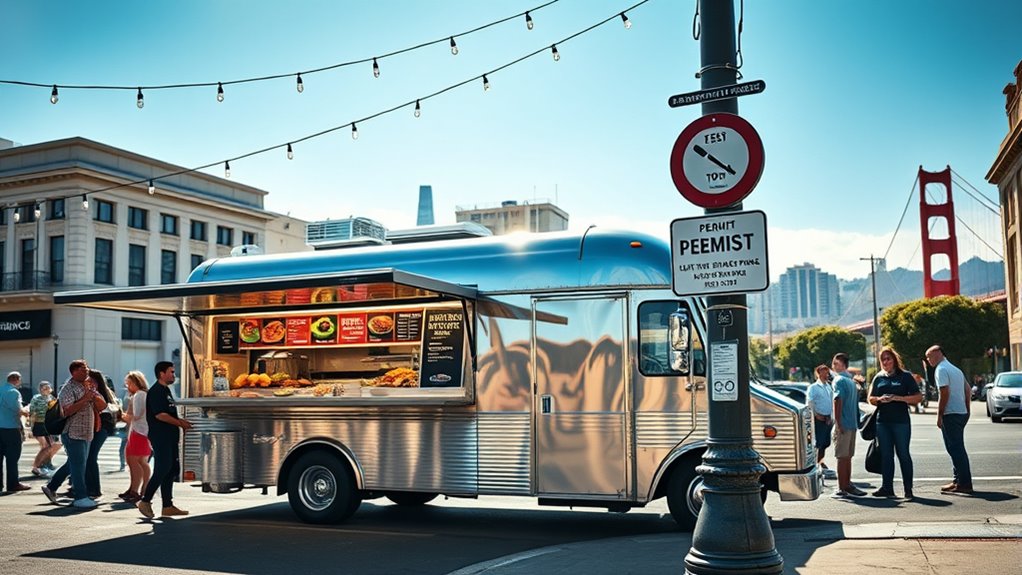
Understanding the financial aspects of launching a food truck in San Francisco helps you plan effectively and avoid surprises. Your initial investment can range from $40,000 to $150,000, depending on truck condition and customizations. Equipment and supplies cost $22,000 to $53,000 upfront, while permits and licenses may total $5,000 to $10,000. Operating expenses include fuel, maintenance, insurance, staff wages, and parking fees, which can add up to $1,700+ monthly. To stay on track, budget for fixed costs like permits and insurance, plus variable costs such as food supplies and wages. A solid plan should include three years of operating capital, accounting for seasonal fluctuations and unexpected expenses. Additionally, incorporating essential cost management strategies can help optimize your budget and ensure long-term success.
Choosing the Right Locations and Ensuring Zoning Compliance

Choosing the right location is essential for your food truck’s success, but it requires maneuvering a variety of zoning rules and permit processes. You’ll need to decide between public property, private property, or public park locations, each with its own permit requirements. Public property, like streets and sidewalks, is governed by DPW permits, while private lots need Planning Department approval. Public parks require special interest forms and additional rules. Keep in mind, street vendor permits restrict operations in residential zones unless you get written permission. You must maintain buffers—at least 75 feet from restaurants, 500 feet from schools, and clear sidewalks—plus specific distances from hydrants, bus zones, and street artists. Proper documentation, site plans, and possible public hearings are essential to ensure compliance and avoid violations. Additionally, understanding projector specifications such as size, resolution, and technology can help optimize your setup for promotional events or outdoor screenings related to your food truck business.
Developing a Safe and Compliant Menu
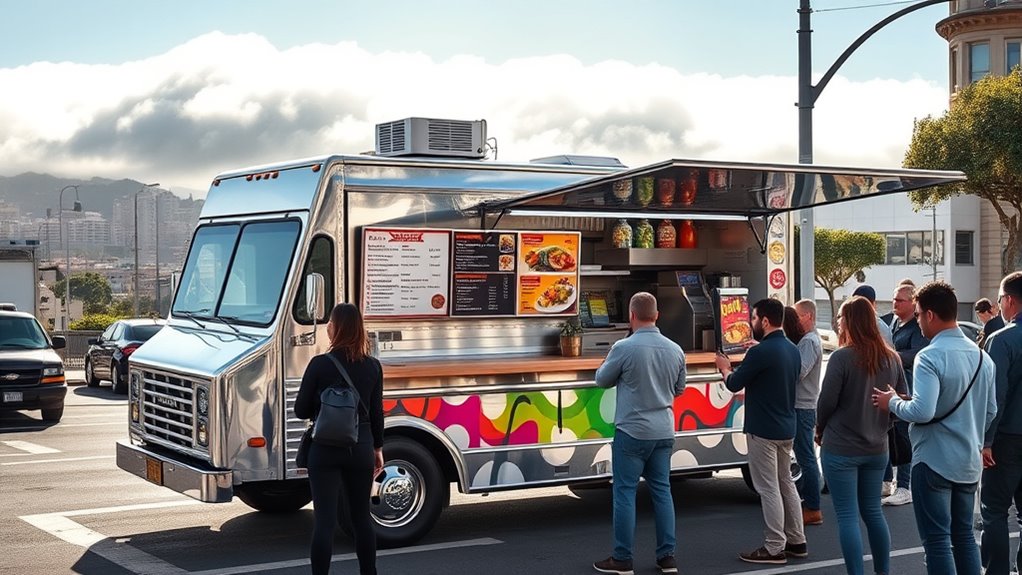
Creating a menu for your food truck involves more than just deciding what dishes to serve; it must also meet strict health and safety standards. You need to guarantee your staff has proper training, including Food Safety Certification for managers and Food Handler Cards for all employees. Keep detailed documentation of these certifications for inspections. Your menu must be clear, including preparation methods, hazards, and warnings for raw or risky foods like sushi. All menu changes require approval from the SF Department of Public Health. Use a licensed commissary for storage and food handling, and develop a plan to maintain proper temperature control. Equipment must fit your space, and refrigeration should keep perishables safe. Proper labeling, sanitation, and compliance with local laws are essential for a safe, legal menu. Food truck inspections are conducted annually at designated facilities to ensure ongoing compliance with health standards. Additionally, implementing predictive analytics can help anticipate customer preferences and adjust your menu accordingly.
Building a Brand and Effective Marketing Strategies

Building a strong brand and implementing effective marketing strategies are essential for standing out in San Francisco’s competitive food truck scene. Your brand should reflect your cuisine, values, and target market to build recognition and trust. Focus on creating a cohesive visual identity—logo, colors, typography, and vehicle wrap—that grabs attention. Consistently apply branding across all touchpoints, from truck exterior to digital channels, to boost recall. Use social media actively: share daily updates, behind-the-scenes content, and promotions on Instagram, Facebook, TikTok, and Twitter. Partner with local influencers, run targeted ads, and incorporate QR codes linking to online menus. Participate in community events, host themed nights, and offer loyalty programs to foster customer loyalty and word-of-mouth buzz. Additionally, incorporating merchandise and branded accessories can further enhance brand visibility and customer engagement.
Managing Applications and Maintaining Compliance

Guiding the application process and ensuring compliance are critical steps when launching a food truck in San Francisco. The permit process can take 30 to 90 days, so start early and use pre-application consultations to clarify requirements and reduce delays. Submit all necessary forms, documentation, and fees to the relevant departments, and consider using automation tools to track your application’s progress. For tentative approval, you’ll need documents like your Business Registration, liability insurance, DMV registration, and health and fire permits. Final approval depends on submitting all documentation and payments on time. Health and fire inspections are mandatory, with costs around $633.50 and $674, respectively. Keep up with health standards, menu changes, and location restrictions to maintain compliance and avoid delays or penalties. Additionally, understanding local zoning and safety regulations, such as those related to fire safety standards, is essential for a smooth approval process.
Frequently Asked Questions
How Long Does the Entire Food Truck Permitting Process Typically Take?
The entire permitting process usually takes between 30 to 90 days, but delays can extend it up to 9 months. You’ll need to submit multiple applications, undergo inspections, and gather various documents. Factors like public objections or incomplete paperwork can slow you down. To stay on track, research requirements early, respond promptly to requests, and prepare for possible delays in health and safety reviews.
Are There Specific Insurance Providers Recommended for San Francisco Food Trucks?
Imagine you’re starting your food truck journey and need reliable insurance. Wexford Insurance is a top choice in San Francisco, offering tailored policies with quick certificates and dedicated support. They understand local risks and provide extensive coverage, including auto, liability, and equipment. Choosing a provider like Wexford ensures you’re protected, allowing you to focus on serving great food while minimizing potential setbacks.
Can I Operate a Food Truck Without a Commissary in San Francisco?
You can’t operate a food truck in San Francisco without a commissary. The local health department mandates all mobile vendors have a licensed commercial kitchen to prepare, store, and handle food safely. Without proof of a commissary agreement, your permit application gets denied, and you risk fines or shutdowns. The law emphasizes commissaries as essential for compliance, waste management, and food safety, making operating without one illegal and unfeasible.
What Are the Most Common Zoning Restrictions Affecting Food Truck Placement?
Imagine the bustling city streets, where your food truck must navigate strict zoning rules. You can’t park within 75 feet of a restaurant’s entrance or block school buffers of 500 or 1,000 feet during school hours. You’ll need permits for public or private property, respecting buffer zones, street furniture, and curb distances. These restrictions guarantee safety, reduce competition, and maintain neighborhood harmony, shaping where and when you can serve your customers.
How Often Do Food Safety Certifications Need to Be Renewed?
You need to renew your food safety certifications regularly to stay compliant. A California Food Handler Card must be renewed every three years, with a simple training and exam, costing $10 or less. Food Manager Certifications are valid for five years and require retaking the exam before expiration. Some local rules may impose additional renewal requirements, so keep track of your certifications to avoid any compliance issues.
Conclusion
Starting your San Francisco food truck journey demands diligent planning, precise permits, and passionate marketing. By balancing bold branding, brilliant locations, and budget-conscious decisions, you’ll build a booming business. Stay strategic, stay compliant, and savor your success. Your food truck adventure awaits—fuel your focus, foster fun, and flourish in the vibrant city streets!
